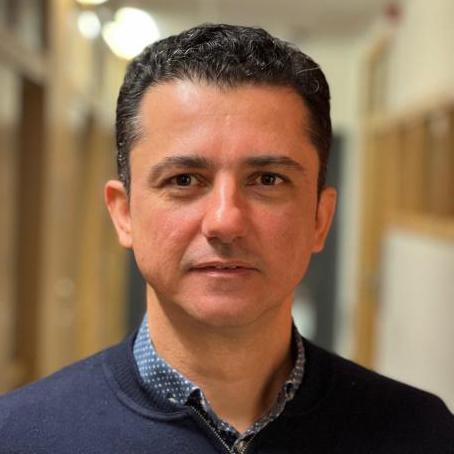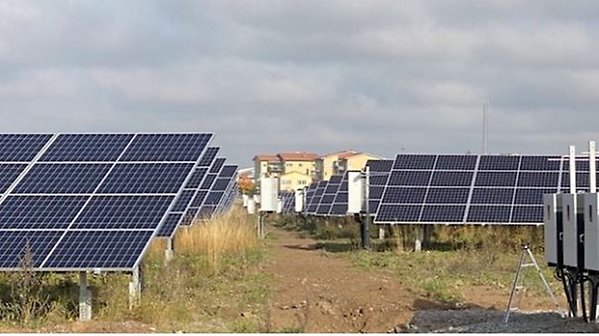6. Planning for Large-scale Expansion
%20Theme%20_cutted.PNG)
The diverse types of PV system at all scales contribute organically to regional and national energy systems and sustainability targets. Going to larger scales, there is a need to guide the development with a top-down perspective so as not to sub-optimise the energy system as a whole. SOLVE will engage directly with physical and digital planning for the PV expansion, taking advantage of big data, machine learning and digitalisation tools as well as urban modelling. SOLVE will have the capability to perform hosting capacity studies, to determine levels of PV penetration, and to develop and evaluate utility-scale solar exploitation guides for proactive planning for large scale PV parks, agrivoltaic installations and PV in urban centres. We will also investigate PV expansion scenarios in Sweden considering the coming developments in large scale energy storage, hydrogen and electrification.
Theme Leaders
%20Joakim%20Widen.JPG)
Professor at Department of Civil and Industrial Engineering, Civil Engineering and Built Environment

Assistant Professor in Electrical Engineeting, electrical Power Systems and Renewable Energy Systems
Project in Theme 6
PhD Project: Mathematics for Energy Systems: Modeling, Simulation, and Analysis

The applied analysis group (Maths@KAU) at the Department of Mathematics and Computer Science, Karlstad University, focuses on understanding the role of mathematics in various areas, including energy systems, data encryption, active materials, and structures. Our work extends into industrial and computational mathematics, contributing significantly to ongoing research endeavors.
This project officially commenced in October 2022, with PhD student Nicklas Jävergård working under the supervision of Prof. Adrian Muntean. Additionally, our project collaborates with SOLVE in several key ways:
The project additionally contributes to SOLVE in the following ways:
- Since October 2022, Maths@KAU has been hosting a Mean-Fields game seminar, extending invitations to relevant SOLVE project members.
- We have introduced courses in data analysis and simulation tailored for industry professionals and SOLVE-affiliated doctoral students.
- Successfully concluding the 7th Mathematics meets Industry Days MiMM™, led by Prof. A. Muntean, Maths@KAU invited several SOLVE partners to participate.
- We actively seek collaboration opportunities with our private SOLVE industry partners, fostering mutually beneficial relationships.
- We are in the process of developing a master's program in industrial and computational mathematics.
- We invite SOLVE partners to propose challenging BSc and MSc thesis topics, where applied mathematics can be applied, and we offer co-supervision opportunities (Contact: Dr. Grigor Nika).
Learn more about the project here.
PhD project: Optimal planning of large-scale solar energy in the built environment

A joint project of Theme3. Enhanced PV systems and Theme 6. Planning for large-scale expansion
The project is about developing mathematical, statistical and machine learning methods to optimize the use of solar power in combination with e.g. battery storage, charging of electric vehicles, heat pump systems and ancillary services to the electricity grid. In addition to this, the work involves developing and applying methods for optimal location and sizing of solar parks, given boundary conditions such as an alternative land use and the hosting capacity of the electricity distribution network.
PhD Project: Data-driven modeling and optimization for solar energy management systems
Supervisors: Adrian Muntean (main, KAU), Grigor Nika (KAU), Andreas Theocharis (KAU)
Description: Complex energy systems are built upon a number of components interacting together via different mechanisms. The assessment of the performance of such complex systems, when user demand and energy prices vary sometimes drastically in time, require simulation tools that can cope with uncertainty. The starting point in this work is to investigate cases where the uncertainty in data either due to measurements or sudden occurrence of defects or by forecasting, becomes non-negligible. To account for these uncertainty effects, careful sensitivity studies of the results versus input data are needed. This project involves the development of micro-macro stochastic modeling tools, multiscale polynomial chaos expansions, numerical simulation and optimization of parameters defining the target solar energy management system(s), where data improves modeling and consequently a better forecast is reachable.
PhD Project: Machine learning in smart electricity grids for large scale PV integration
Supervisors: Andreas Theocharis (main, KAU), Andreas Kassler (KAU), David Lingfors (UU)
Description: Large-scale integration of distributed energy resources such as solar PV systems is accomplished by digitalized smart electricity grids. The observation of the electricity grid, the environmental conditions and the end-users habits via big-data time-series collections and IoT is a key feature for efficient operations and planning. The existence of partially and/or unobserved localities with limited available data due to reasons such as grid expansion, technical failures, economic and social interference, cybersecurity and legal issues have an important role on the prediction of the energy supply, the load demand, the associated uncertainties as well as on the overall system management and planning. In this project, we will investigate possible solutions about energy production and demand forecasting based on Machine Learning and Edge Compute. These are substantial features for the development of smart electricity grids and intelligent management in order to limit grid investments for grid reinforcement and data collection sites.
To enable an accurate forecast of multiple prosumers in the system, we will explore the application of Machine Learning (ML) techniques like Federated Learning in combination to edge computing aiming to deploy the system in each smart energy grid. Furthermore, we will investigating the possibility of making the ML algorithm more understandable with interpretable ML techniques. This is important for the grid operators because it makes the predictions more trustworthy. Lastly, constant evaluation of the current running predictor is an important factor in ML to make sure that it predicts in the best possible way. As such, we are going to use drift detection techniques.
PhD Project: System integration and planning of large-scale solar power
Supervisors: Joakim Munkhammar (main, UU), David Lingfors (UU), Andreas Kassler (KAU)
Description: In order to reach the goal for 100% renewable electricity production in Sweden until 2040, a widespread expansion of renewable power generation is required over the next decades. A significant part of this will most likely be solar power and, judging from recent developments, in the form of large-scale solar parks. Integrating large amounts of solar power in the energy system requires both optimization of how the variable power is used and managed, and planning of where and how to locate and size solar parks. Therefore the PhD candidate will work on developing mathematical, statistical and machine learning methods for optimizing solar power utilization in local energy systems, using electricity management systems in combination with, e.g., battery storage, electric vehicle charging, heat pump systems, and providing grid ancillary services. In addition to this, the PhD student will develop and apply methods for optimal siting and sizing of solar parks, given a wide variety of alternative land uses and constraints, including the hosting capacity of the electricity distribution grid. The project involves case studies of solar utilization planning together with a number of Swedish municipalities and distribution system operators that are partners in SOLVE.
